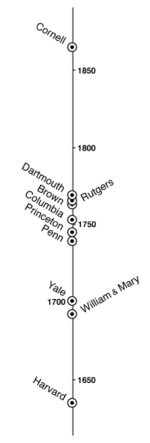Ivy League
 From Conservapedia
From Conservapedia 
The Ivy League is an athletic conference of eight private universities in the Northeast. During the first half of the 1900s, teams from the schools played each other frequently. By the 1930s they were referred to informally as the "Ivy League," but the organization was not formalized until 1954.
By extension, the term also refers to the eight schools considered as a group, and to social characteristics perceived to be common to their group. The schools of the Ivy League are all old—all but Cornell having been founded before the American Revolution. They are sometimes referred to as the Ancient Eight.[2] They are all stellar in academics, and all of them have a traditional connection with social prestige.
Six of the Ivy League schools were founded as Protestant institutions, firmly connected with specific denominations, such as Lutheranism. Penn and Cornell were founded as nonsectarian. Of the six founded as Protestant, Brown, although Baptist (and requiring undergraduates to attend chapel) was founded with a charter guaranteeing religious liberty. Princeton's charter was tied to the New Light wing of the Presbyterian Church, but was to be open to all students, "any different sentiments in religion notwithstanding."[3]
The nickname Ivy League comes from the old brick buildings on their campuses, which have, over time, grown dense coverings of ivy.
Its members include Harvard University, Yale University, Columbia University, Dartmouth College, Brown University, University of Pennsylvania, Princeton University, and Cornell University. Currently, all eight Ivy League schools accept applications from homeschooled students.
At Harvard, Yale, and Columbia, the undergraduate schools which issue baccalaureate degrees are named Harvard College, Yale College, and Columbia College. Alumni of these schools often identify themselves with the college rather than the university as a whole; thus, Harvard alumni may describe their degree as a "B.A. from Harvard College" rather than as a "B.A. from Harvard University." Dartmouth is unusual in that, for historical reasons, the university as a whole is referred to as Dartmouth College, so an alumnus of the doctoral program has a "Ph.D. from Dartmouth College."[4]
Notes and references[edit]
- ↑ Founding dates are those self-reported by the institutions: Harvard 1636, William & Mary 1693, Penn 1740, Princeton 1746, Columbia 1754, Brown 1764, Rutgers 1766, Dartmouth 1770, Cornell 1865.
- ↑ Harvard, Yale, and Princeton were at one time referred to as the Ancient Three. The phrase Ancient Eight may be an extension of that phrase. The Ivy League is not comprised of the eight oldest colleges in the U. S., however. It fails to include William and Mary or Rutgers, and includes Cornell, which is younger than many other colleges.
- ↑ Princeton University in the American Revolution, Princeton University website: "The charter was issued to a self-perpetuating board of trustees who were acting in behalf of the evangelical or New Light wing of the Presbyterian Church, but the College had no legal or constitutional identification with that denomination. Its doors were to be open to all students, 'any different sentiments in religion notwithstanding.'"
- ↑ In this regard Dartmouth is unusual but not unique. Some other universities also retain the name "college" for reasons of history or tradition, notably the College of William and Mary and Boston College.
Categories: [Education]
↧ Download as ZWI file | Last modified: 02/26/2023 07:04:49 | 50 views
☰ Source: https://www.conservapedia.com/Ivy_League | License: CC BY-SA 3.0
 ZWI signed:
ZWI signed: KSF
KSF